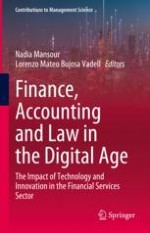This book focuses on understanding Innovation in the Financial Services Sector. The collection of contributions gathered in the book highlights the importance of technology contexts that pertain to Finance, accounting, and the law arena. The respective chapters address topics such as Economic development, social entrepreneurship, Online Behaviour, Digital entrepreneurship, and Islamic banks. All contributions are based on the latest empirical and theoretical research and provide key findings and concrete recommendations for scholars, entrepreneurs, organizations, and policymakers.
